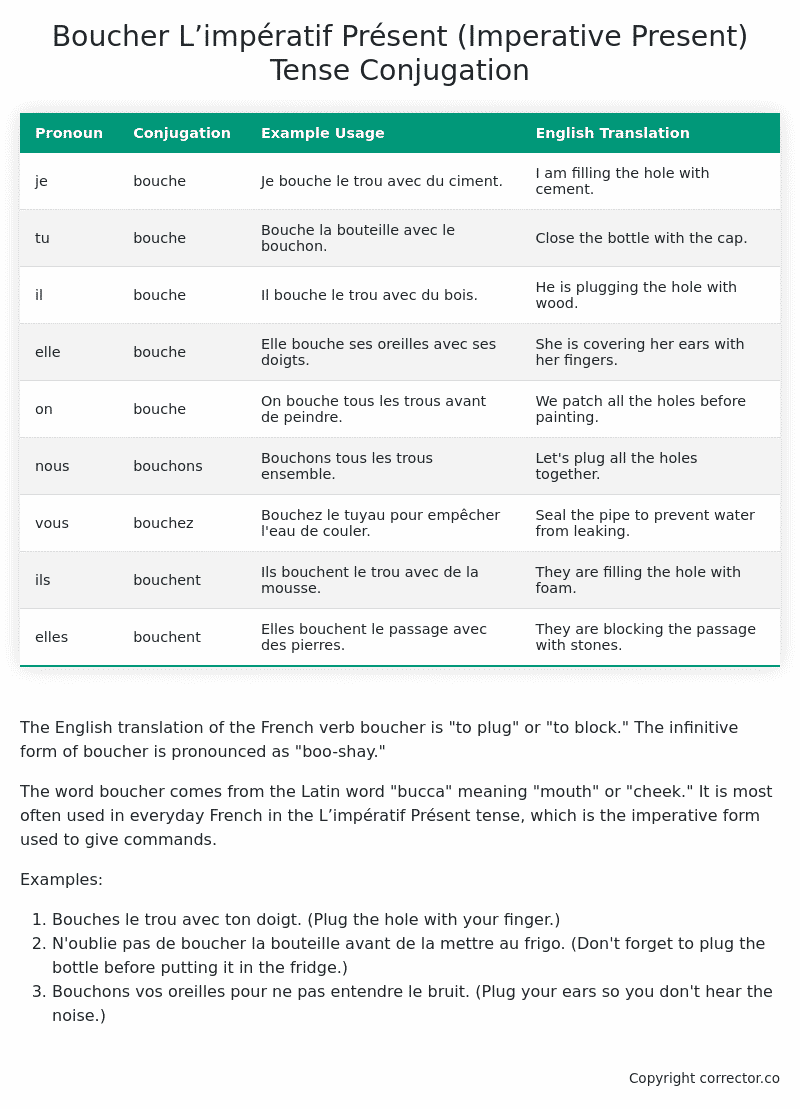L’impératif Présent (Imperative Present) Tense Conjugation of the French Verb boucher
Introduction to the verb boucher
The English translation of the French verb boucher is “to plug” or “to block.” The infinitive form of boucher is pronounced as “boo-shay.”
The word boucher comes from the Latin word “bucca” meaning “mouth” or “cheek.” It is most often used in everyday French in the L’impératif Présent tense, which is the imperative form used to give commands.
Examples:
- Bouches le trou avec ton doigt. (Plug the hole with your finger.)
- N’oublie pas de boucher la bouteille avant de la mettre au frigo. (Don’t forget to plug the bottle before putting it in the fridge.)
- Bouchons vos oreilles pour ne pas entendre le bruit. (Plug your ears so you don’t hear the noise.)
Table of the L’impératif Présent (Imperative Present) Tense Conjugation of boucher
| Pronoun | Conjugation | Example Usage | English Translation |
|---|---|---|---|
| je | bouche | Je bouche le trou avec du ciment. | I am filling the hole with cement. |
| tu | bouche | Bouche la bouteille avec le bouchon. | Close the bottle with the cap. |
| il | bouche | Il bouche le trou avec du bois. | He is plugging the hole with wood. |
| elle | bouche | Elle bouche ses oreilles avec ses doigts. | She is covering her ears with her fingers. |
| on | bouche | On bouche tous les trous avant de peindre. | We patch all the holes before painting. |
| nous | bouchons | Bouchons tous les trous ensemble. | Let’s plug all the holes together. |
| vous | bouchez | Bouchez le tuyau pour empêcher l’eau de couler. | Seal the pipe to prevent water from leaking. |
| ils | bouchent | Ils bouchent le trou avec de la mousse. | They are filling the hole with foam. |
| elles | bouchent | Elles bouchent le passage avec des pierres. | They are blocking the passage with stones. |
Other Conjugations for Boucher.
Le Present (Present Tense) Conjugation of the French Verb boucher
Imparfait (Imperfect) Tense Conjugation of the French Verb boucher
Passé Simple (Simple Past) Tense Conjugation of the French Verb boucher
Passé Composé (Present Perfect) Tense Conjugation of the French Verb boucher
Futur Simple (Simple Future) Tense Conjugation of the French Verb boucher
Futur Proche (Near Future) Tense Conjugation of the French Verb boucher
Plus-que-parfait (Pluperfect) Tense Conjugation of the French Verb boucher
Passé Antérieur (Past Anterior) Tense Conjugation of the French Verb boucher
Futur Antérieur (Future Anterior) Tense Conjugation of the French Verb boucher
Subjonctif Présent (Subjunctive Present) Tense Conjugation of the French Verb boucher
Subjonctif Passé (Subjunctive Past) Tense Conjugation of the French Verb boucher
Subjonctif Imparfait (Subjunctive Imperfect) Tense Conjugation of the French Verb boucher
Subjonctif Plus-que-parfait (Subjunctive Pluperfect) Tense Conjugation of the French Verb boucher
Conditionnel Présent (Conditional Present) Tense Conjugation of the French Verb boucher
Conditionnel Passé (Conditional Past) Tense Conjugation of the French Verb boucher
L’impératif Présent (Imperative Present) Tense Conjugation of the French Verb boucher (this article)
L’infinitif Présent (Infinitive Present) Tense Conjugation of the French Verb boucher
Struggling with French verbs or the language in general? Why not use our free French Grammar Checker – no registration required!
Get a FREE Download Study Sheet of this Conjugation 🔥
Simply right click the image below, click “save image” and get your free reference for the boucher L’impératif Présent tense conjugation!

Boucher – About the French L’impératif Présent (Imperative Present) Tense
Usage
Giving commands
Making requests
Offering advice
Expressing desires
Conjugation Formation
Interactions with other tenses
Want More?
I hope you enjoyed this article on the verb boucher. Still in a learning mood? Check out another TOTALLY random French verb conjugation!


